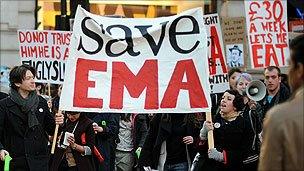Big battles to come over benefits
- Published

Education Maintenance Allowance is being scrapped in England
On a cold January day, Tali Janner-Klausner took to the streets crowded with fellow students carrying placards to protest over £30 a week.
The 19-year-old, a part-time student at City Lit college in London, felt the Education Maintenance Allowance (EMA) payments were worth fighting for.
"Some of the cabinet are millionaires and the government's propped up by big business. They do not understand what £30 a week means to many people," she said at the protest.
Similar sentiments may be heard in the coming months, as changes over relatively small amounts for welfare claimants prove to be a big deal.
The Joseph Rowntree Foundation estimated that a single person in the UK needed a gross income of at least £14,400 in 2010 to live to an acceptable standard - that is £277 a week.
Losing a chunk - even just £30 a week - would clearly have an effect on low-income individuals. So every change will cause debate and protest.
'Expensive'
The EMA protest was ultimately in vain. EMA payments, which are paid to low-income students if they stay at school or college, will be scrapped in England. Wales and Scotland have the payment, which is under review in Northern Ireland.
Scrapping the allowance is just the first of a number of major changes this year, and in the next couple of years, to the benefits system.
The government says this needs to be done, not only to balance the books but also to make the welfare system fairer and less complicated.
EMA, it argues, is expensive and "poorly targeted" - a claim that may also be used with other benefits.
But charities are bracing themselves for a surge in inquiries, chiefly over changes to housing benefit and sickness benefits.
"With the Budget announcements, Chancellor George Osborne wasted no time in wielding the axe," says Lee Healey, managing director of benefits advisers IncomeMAX.
"Parents with children were the big losers. Pensioners got off relatively unscathed.
"Those on Housing Benefit and disabled people will be fearful for the future."
So what exactly will these changes be?
Housing
Housing benefit is aimed at people on low incomes who need help paying their rent.

The government is attempting to simplify and tighten up the system
The changes this year will include a cap on housing benefit starting in April for those taking new tenancies and the benefit will be pegged to the lowest third of local rents.
"We expect to see many more people experiencing poverty, debt, rent arrears and homelessness as a result of these changes," says Lizzie Iron, head of welfare at Citizens Advice.
The government says it spends more on housing benefit than on the police and universities combined.
Disability and sickness
This is another area which benefits advisers expect a raft of inquiries. Incapacity Benefit and its successor, Employment and Support Allowance (ESA), are paid to those who cannot work because of illness and disability.
Thousands of people who are receiving Incapacity Benefit are being reassessed for their claims. Those who pass will receive EMA, those who fail would have to move on to other benefits such as Jobseekers' Allowance.
Citizens Advice has questioned the validity of these assessments.
"Many seriously ill and disabled people have already been wrongly found fit for work and had their benefit withdrawn, leading to enormous stress and hardship," says Ms Iron.
The government says it will still protect those with genuine needs.
Families
Changes to Child Benefit, tax credits and help for expectant mothers will also mark a significant squeeze for families in 2011.

Families are facing some of the most significant changes to the welfare system
Already, the £500 per child Sure Start maternity grant is being restricted to the first child in a family.
From April, universal Child Benefit will be frozen for three years, at £20.30 for a first or only child and £13.40 for each other child.
The government says this will save about £1bn.
Changes to the thresholds in the tax credits system in April will see payments reduce faster as income rises.
Also from April, eligible families will be able to claim only up to 70% of childcare costs, compared with 80% of their childcare costs if they use registered or approved childcare at present.
"Families are being asked to absorb much of the pain of the changes to UK tax and benefits," says Katherine Rake, chief executive of the Family and Parenting Institute.
"This is in addition to family finances taking a hit from the VAT rise, the widely predicted increases in mortgage payments, and increases in food, fuel, clothing and energy bills."
Other withdrawals for higher rate taxpayers will also take effect in 2013.
Justification
So what is the justification for these cuts?
The government argues that there is simply not the money available to continue with the huge variety of benefits in the UK in their current form as it looks to balance the country's books.
It also says that some benefits are being claimed by those who are not entitled to them.
Benefits adviser Lee Healey says this could be one of the most significant moves of the new government's first year in charge.
"Evolving from a 1940s system that was supposed to pay for itself through National Insurance, you fast forward to 2010 and find a welfare system which the majority of the general public do not understand and one which is plagued by criticism for being too easy to claim and open to fraud," he says.
"2010 will go down in history as the year a UK government finally tried to get to grips with and make changes to the complex and expensive labyrinth that is the welfare system."
This complexity is behind the biggest shake-up of all, planned for 2013. Universal Credit will replace benefits such as Jobseekers' Allowance, Income Support, Employment and Support Allowance, tax credits, and Housing Benefit.
Expect the debate - and potentially the protests - to continue for some time.